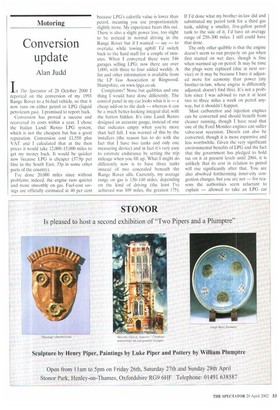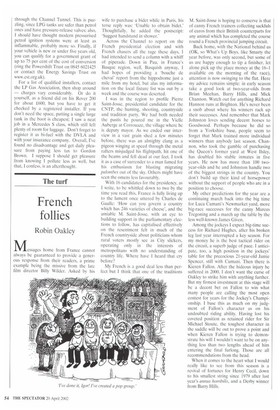Motoring
Conversion update
Alan Judd
In The Spectator of 28 October 2000 I reported on the conversion of my 1993 Range Rover to a bi-fuel vehicle, so that it now runs on either petrol or LPG (liquid petroleum gas). I promised to report back.
Conversion has proved a success and recovered its costs within a year. I chose the Italian Landi Renzo LPG system, which is not the cheapest but has a good reputation. Conversion cost £1,550 plus VAT and I calculated that at the then prices it would take 12,000-15,000 miles to get my money back. It would be quicker now because LPG is cheaper (37.9p per litre in the South East, 33p in some other parts of the country).
I've done 20,000 miles since without problems: indeed, the engine runs quieter and more smoothly on gas. Fuel-cost savings are officially estimated at 40 per cent because LPG's calorific value is lower than petrol, meaning you use proportionately slightly more. My experience bears this out. There is also a slight power loss, too slight to be noticed in normal driving in the Range Rover but if I wanted — say — to overtake while towing uphill I'd switch back to the hard stuff for a couple of minutes. When I converted there were 546 garages selling LPG; now there are over 1,000, with three to four added weekly. A list and other information is available from the LP Gas Association at Ringwood. Hampshire, on www.lpga.co.uk.
Complaints? None but quibbles and one thing I would have done differently. The control panel in my car looks what it is — a cheap add-on to the dash — whereas it can be a much better-looking integral dial, with the button hidden. It's time Landi Renzo designed an accurate gauge, instead of one that indicates empty when you're more than half full. I was warned of this by the installers (the reason has to do with the fact that I have two tanks and only one measuring device) and in fact it's very easy to estimate endurance by setting the trip mileage when you fill up. What I might do differently now is to have three tanks instead of two concealed beneath the Range Rover sills. Currently, my average range on gas is 130-140 miles, depending on the kind of driving (the least I've achieved was 109 miles, the greatest 175).
If I'd done what my brother-in-law did and substituted my petrol tank for a third gas tank, adding a smaller, five-gallon petrol tank to the side of it, I'd have an average range of 250-300 miles. I still could have that done.
The only other quibble is that the engine doesn't seem to run properly on gas when first started on wet days, though is fine when warmed up on petrol. It may be time the plugs were replaced (due at next service) or it may be because I have it adjusted more for economy than power (my brother-in-law, whose engine is differently adjusted, doesn't find this). It's not a problem since I was advised to run it at least two to three miles a week on petrol anyway, but it shouldn't happen.
Most carburettor and injection engines can be converted and should benefit from cleaner running, though I have read that one of the Ford Mondeo engines can suffer valve-seat recession. Diesels can also be converted, though it is more expensive and less worthwhile. Given the very significant environmental benefits of LPG and the fact that the government has pledged to hold tax on it at present levels until 2004, it is unlikely that its cost in relation to petrol will rise significantly after that. You are also absolved forthcoming inner-city congestion charges, but you are not — for reasons the authorities seem reluctant to explain — allowed to take an LPG car through the Channel Tunnel. This is puzzling, since LPG tanks are safer than petrol ones and have pressure-release valves; also, I should have thought modern pressurised petrol ignition systems were at least as inflammable, probably more so. Finally, if your vehicle is new or under five years old, you can qualify for a government grant of up to 75 per cent of the cost of conversion (ring the Powershift Trust on 0845 6021425 or contact the Energy Savings Trust on vvww.est.org.uk).
For a list of qualified installers, contact the LP Gas Association, then shop around — charges vary considerably. Or do it yourself, as a friend did on his Rover 200 for about £600, but you have to get it checked by a registered installer. If you don't need the space, putting a single large tank in the boot is cheapest; I saw a neat job in a Mercedes S class, which still left plenty of room for luggage. Don't forget to register it as hi-fuel with the DVLA and with your insurance company. Overall, I've found no disadvantage and get daily pleasure from paying less tax to Gordon Brown. I suppose I should get pleasure from knowing I pollute less as well, but that, I confess, is an afterthought.







































































 Previous page
Previous page